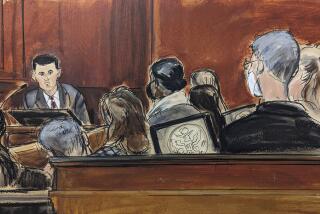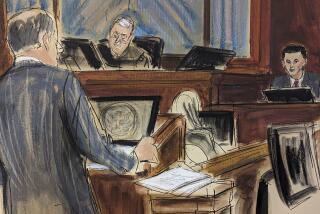Ex-Enron Exec Expresses Regret
- Share via
HOUSTON — A former top Enron Corp. executive testified at the trial of Kenneth L. Lay and Jeffrey K. Skilling on Wednesday that he regretted taking part in a scheme to disguise massive losses at the energy company.
The witness, David Delainey, has provided some of the most damaging testimony yet against former Enron Chief Executive Skilling. However, he could be overshadowed by the prosecution’s star witness, former Chief Financial Officer Andrew S. Fastow, who prosecutors said could take the witness stand as early as Monday.
Delainey had testified Tuesday that the company shifted hundreds of millions of dollars in losses from its struggling retail energy business to its stronger wholesale division but did not disclose the move to investors, all with the consent of Skilling.
Under withering cross-examination from Skilling’s lawyer, Daniel Petrocelli, Delainey said the March 2001 meeting with Skilling and other top managers where the decision was made to hide the losses stuck out as the most egregious act of dishonesty he participated in at the company.
“Every day I wish I would have stepped up from that table and walked out. That was the worst conduct I had ever been part of, and everybody knew exactly what was going on at that meeting,” said Delainey, who served as chief executive of Enron’s retail business and its North American trading division.
Petrocelli had sought to portray Delainey’s testimony -- which directly put Skilling at the hub of misdeeds at the company -- as misinterpreting statements that Skilling made at that meeting.
Skilling faces 31 charges of conspiracy, fraud and insider trading, and Lay, Enron’s founder and former chairman, faces seven charges of conspiracy and fraud linked to the company’s demise. Both men face decades in prison if they are found guilty.
Lay and Skilling have said they knew of no illicit actions at Enron and have laid the blame for Enron’s collapse on Fastow, the financial whiz who operated the off-balance-sheet partnerships used to hide billions of dollars in debt and inflate profit.
Fastow took home tens of millions of dollars in fees from those partnerships. He has struck a plea deal to cooperate with prosecutors that is expected to send him to prison for 10 years.
Delainey, a Canadian citizen, has pleaded guilty to insider trading and is cooperating with the government in a bid to reduce his prison sentence, which could be as many as 10 years.
He showed little sign of being rattled by Petrocelli’s aggressive, rapid-fire questioning, often finishing his answers by characterizing statements he and others made in Enron’s final months as lies.
“Do you feel compelled to say that? Are you saying that so the jury will think Mr. Skilling is guilty?” Petrocelli asked him at one point.
“He was at the table with me; he had all the same information I had,” Delainey responded.
Enron’s December 2001 bankruptcy filing was the largest ever in the U.S. at the time. The scandal was the first of several to hit Wall Street and triggered the passage of new laws aimed at improving corporate disclosures.
More to Read
Inside the business of entertainment
The Wide Shot brings you news, analysis and insights on everything from streaming wars to production — and what it all means for the future.
You may occasionally receive promotional content from the Los Angeles Times.










